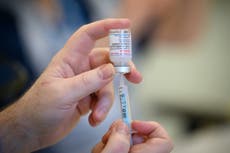Flu could ‘bite’ as early as October, NHS leaders and scientists warn
Risk the NHS’s ‘winter crisis’ will be extended this year
Flu could “bite” months earlier than usual this year, NHS leaders and scientists have warned, leading to calls for millions to get their vaccination against the disease as soon as possible.
Around 20 million people in the UK, including all over-50s, will be offered a free jab this winter, as ministers fear the combination of a bad flu season, Covid and a cost of living crisis could lead to a spike in deaths.
Saffron Cordery, the interim chief executive of NHS Providers, which represents trusts in England, warned that the effects of flu could be being felt as early as October instead of December, as is usually seen each year.
Experts warned the public not to delay when they are invited to receive their jab. Those not eligible for a free vaccine can also buy them on the high street, they highlighted.
In an interview with The Independent, Ms Cordery warned that this year flu had “come early and severely to parts of the southern hemisphere, and we’re going see it here potentially biting in October”.
That would greatly extend the “winter crisis” in the health service, she added.
Dr John McCauley, director of the Worldwide Influenza Centre at the highly respected Francis Crick Institute in London, described the warning as “reasonable”.
Professor Matt Keeling, epidemiologist at Warwick University, and a member of the government’s advisory group Sage, said his “expectation is that flu will come early” this year.
Precautionary measures like mask-wearing, social distancing and good hygiene had reduced flu levels in recent years, he said.
“However, this means that there is probably slightly less immunity in the population than in ‘normal’ years, although the extended vaccination programme last year will help mitigate some of this.”
He said rates of flu would probably start rising in October and peak in late November, rather than December or January. Even a small surge would place extra pressure on an already overburdened health service, and a synchronised flu and Covid wave “could be extremely problematic,” Prof Keeling added.
“When offered, people need to get their winter flu jab as soon as possible, and the same for the Covid booster,” he said.
“Unfortunately, an earlier rollout of the vaccine was impossible, the vaccine takes time to manufacture and we can only deploy it once it gets delivered into the UK from the manufacturers.”
Data from the UK Health Security Agency suggests that the prevalence of influenza in London and the southeast of England is on the rise, according to Dr Charlotte Houldcroft, a lecturer in the Department of Genetics at the University of Cambridge, who said there was “cause for concern” over the coming flu season.
Dr Sarah Pitt, a microbiologist at the University of Brighton, also pointed to what happened in Australia as an indication of what is expected to happen in the northern hemisphere.
“I agree that we should be preparing for both high numbers of influenza cases and an early start to the season here in Europe,” she said.
While it takes months to prepare flu vaccines due to the way they are made, “I would have thought it should be possible to start [the vaccination programme] a week or two early, and to start publicising it,” she said.
Professor Wendy Barclay, head of the Department of Infectious Disease at Imperial College London and another member of Sage, said: “I think many of us are expecting that there might be rather more flu than in the previous two years, and I agree that getting vaccines into people is important.
“But there is always the argument that if you go too early, that immunity on the most vulnerable might have waned by January when we often see a lot of flu.”
Shadow health secretary Wes Streeting accused the Conservative government of being “nowhere to be seen” throughout a perfect storm of “a new wave of flu, soaring energy bills forcing many to turn their heating off, while the NHS is already struggling to provide basic and timely care for patients”.
A Department of Health and Social Care (DHSC) spokesperson said ministers were conscious of the challenges this winter may pose for the NHS and preparations were “well under way”.
People who are most vulnerable, such as those aged 65 and over, or those in high-risk groups, will be offered the flu jab first. It will then be widened out to other eligible groups, such as the over-50s and children in school years 7-9.
“The NHS has also set out further measures to rapidly boost overall capacity and resilience ahead of this winter, such as creating the equivalent of at least 7,000 more beds, including through innovative virtual wards,” the DHSC spokesperson added.
Join our commenting forum
Join thought-provoking conversations, follow other Independent readers and see their replies
Comments


Bookmark popover
Removed from bookmarks